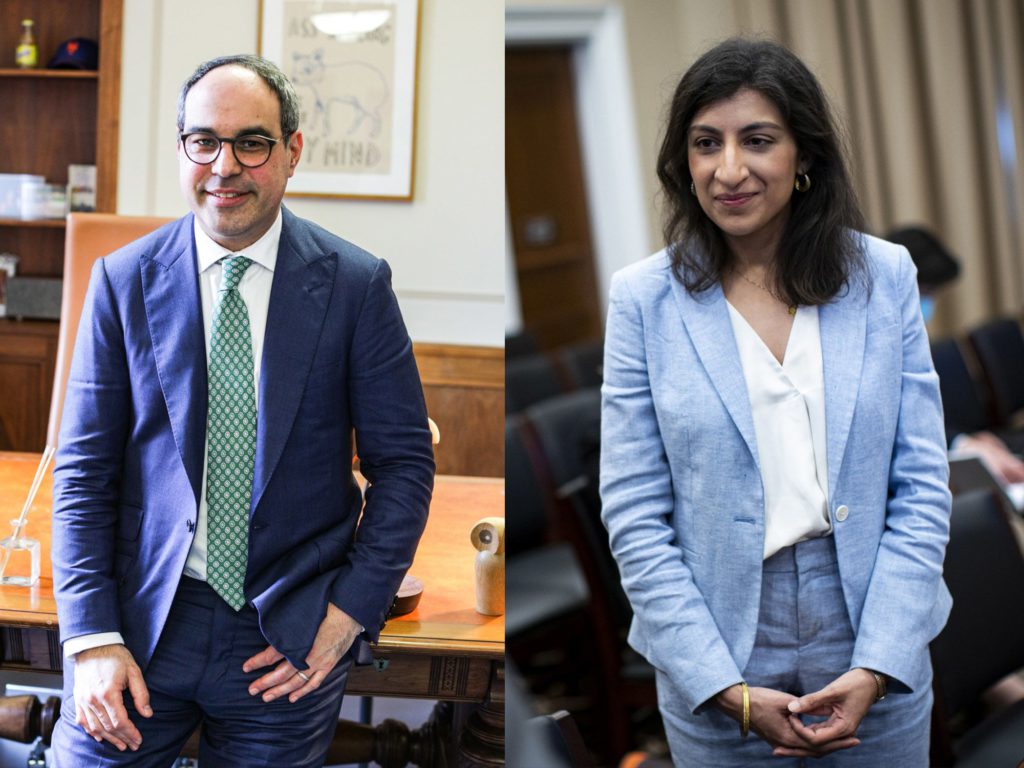Supporters of a landmark antitrust bill gathered over beer and soft pretzels at Cafe Berlin on Capitol Hill last week to muster energy for one last push to rein in the dominance of giant technology companies.
(Bloomberg) — Supporters of a landmark antitrust bill gathered over beer and soft pretzels at Cafe Berlin on Capitol Hill last week to muster energy for one last push to rein in the dominance of giant technology companies.
Recognizing that the measure won’t come up for a vote before the Nov. 8 midterms, the group set its sights on how to try and jam the legislation through the brief “lame duck” period after the elections. That’s a tight window before January, when a new Congress convenes that will likely be hostile to the effort.
The invitation to the Oktoberfest-themed event was hosted by groups funded by eBay Inc. founder and tech critic Pierre Omidyar’s foundation, and billed it as “an opportunity to gather strength for one final legislative push.”
“Election year or not, there’s no reason this can’t get done over the coming months,” said Matt Fossen, a lobbyist who didn’t attend the Cafe Berlin function but works for Proton Mail, an email service that’s advocating for the bill. “Getting these proposals over the finish line will continue to be our priority.”
The bill seeks to restrict internet giants like Amazon.com Inc., Apple Inc., Alphabet Inc.’s Google and Meta Platforms Inc. from favoring their own products, so that competitors who depend on these platforms to reach consumers wouldn’t be at a disadvantage. That could impact the design of Google Maps, the display of Apple Music on an iPhone or the prominence of Amazon Basics on the company’s e-commerce site.
During the Cafe Berlin get-together, Senator Elizabeth Warren, a Democrat from Massachusetts who supports the bill, held court on the sidewalk, according to several attendees who asked not to be identified discussing details of the private event. Federal Trade Commission Chair Lina Khan and Assistant Attorney General Jonathan Kanter — the government’s top antitrust enforcers — stopped by after testifying in the Senate that day. Dozens of other officials and activists were also there.
The legislation, which grew out of a House antitrust investigation of the companies led by Rhode Island Democrat David Cicilline, has advanced further than any other effort to address the market power of some of the world’s richest companies.
Killing the bill, named the American Innovation and Choice Online Act, is a top priority for opponents. Amazon, Apple, Google, Meta and their trade groups have poured almost $95 million into lobbying since 2021, much of it focused on the measure.
The bill has been approved by the House and Senate Judiciary Committees with bipartisan votes, but Democratic leaders in both chambers have resisted pressure to bring it to a vote. Senate Majority Leader Chuck Schumer told donors in July that he doesn’t think the measure has enough votes to pass, although the bill’s sponsors insist that it does.
At a White House briefing on Wednesday, Press Secretary Karine Jean-Pierre declined to say if President Joe Biden is pushing Schumer to schedule a vote. But, she said, he has made clear his concern about “the power larger social-media platforms have over everyday lives.”
“I don’t have anything specific on that particular legislation,” she said.
Supporters of the bill, including companies such as digital streaming device maker Roku Inc., have held meetings in recent weeks with lawmakers and their staffs to shore up backing for the measure.
Lobbyists for the technology giants argue that the measure would weaken privacy, threaten national security and degrade products that consumers enjoy.
If the legislation doesn’t pass by the end of this Congress, it’s unlikely to make it to the floor for several years, particularly if there’s a new GOP majority in the House, as polls have predicted. House Minority Leader Kevin McCarthy, a Republican from California who is in line to become speaker should his party win control, has vehemently opposed the bill, calling it partisan overreach.
So that leaves one final — and unlikely — shot for the bill’s supporters. Lame duck is not typically the time when major legislation gets passed, but it can happen. In 2018, after Democrats won control of the House but before their new majority was sworn in, Congress passed bipartisan criminal justice reform.
One of the lead cheerleaders for that project, Iowa Senator Chuck Grassley, a Republican, is also an original co-sponsor of the tech bill.
Grassley earlier this year said he had as many as 20 fellow Republicans who would vote for the legislation — more than enough to get to the necessary 60 votes, even if a half-dozen of Democrats’ 50 senators vote against it.
But several Democrats, concerned that the measure would make it more difficult for the tech platforms to take down hate speech and misinformation, have insisted on amendments that could threaten that delicate equation. And Grassley hasn’t given a recent estimate for the level of Republican support.
Other sponsors, including the bill’s champion, Democratic Senator Amy Klobuchar of Minnesota, have insisted that they have enough votes to pass the measure.
Klobuchar and Cicilline didn’t respond to requests for comment for this story. At an industry conference earlier this month, Klobuchar blamed the bill’s delay on tech industry lobbying.
“There has been an incredible amount of money that I’m up against,” Klobuchar said on Sept. 7. “But I wouldn’t count us out for a minute.”
(Updates with White House comment beginning in 10th paragraph)
More stories like this are available on bloomberg.com
©2022 Bloomberg L.P.











